外研版(2019)选择性必修 第一册Unit 1 Laugh out loud! Developing ideas课件(共31张PPT)
文档属性
| 名称 | 外研版(2019)选择性必修 第一册Unit 1 Laugh out loud! Developing ideas课件(共31张PPT) | 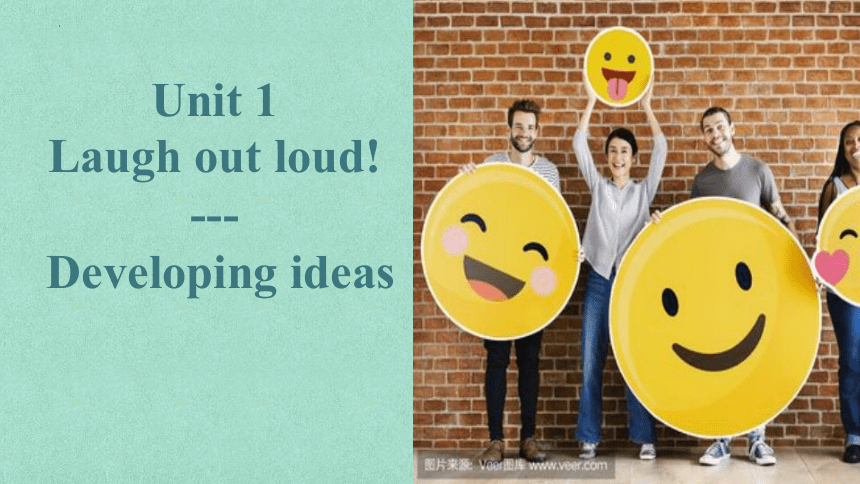 | |
| 格式 | pptx | ||
| 文件大小 | 3.2MB | ||
| 资源类型 | 教案 | ||
| 版本资源 | 外研版(2019) | ||
| 科目 | 英语 | ||
| 更新时间 | 2023-03-30 22:40:19 | ||
图片预览

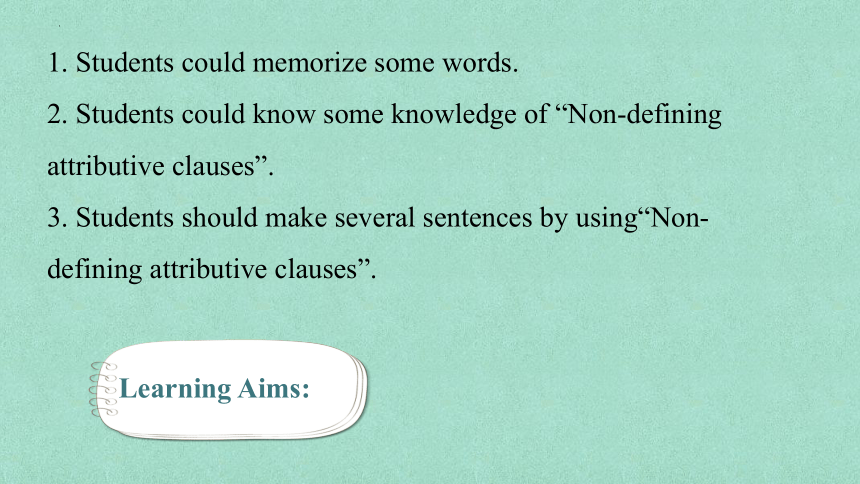
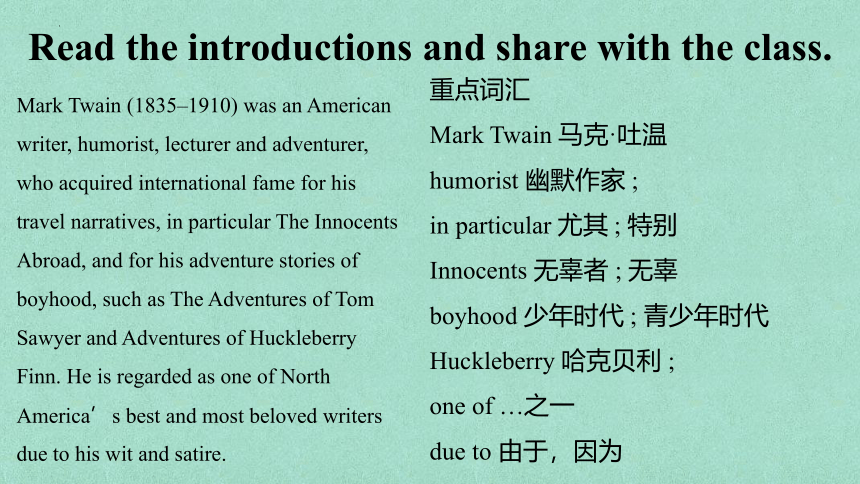
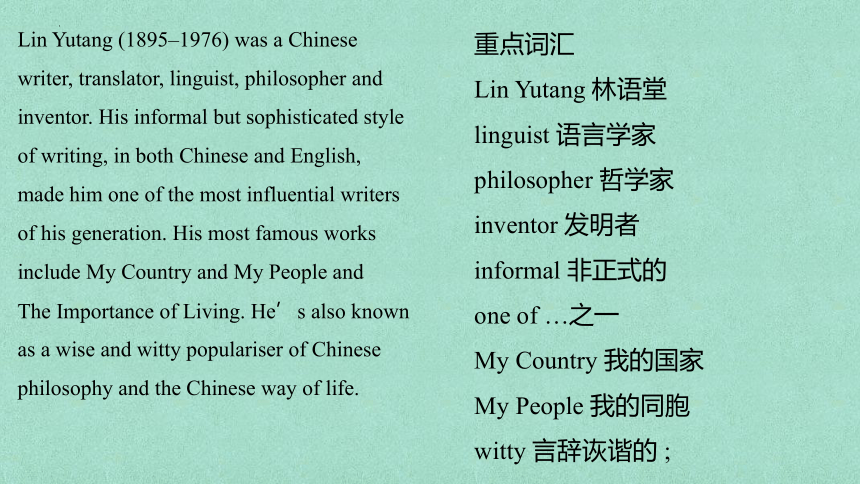
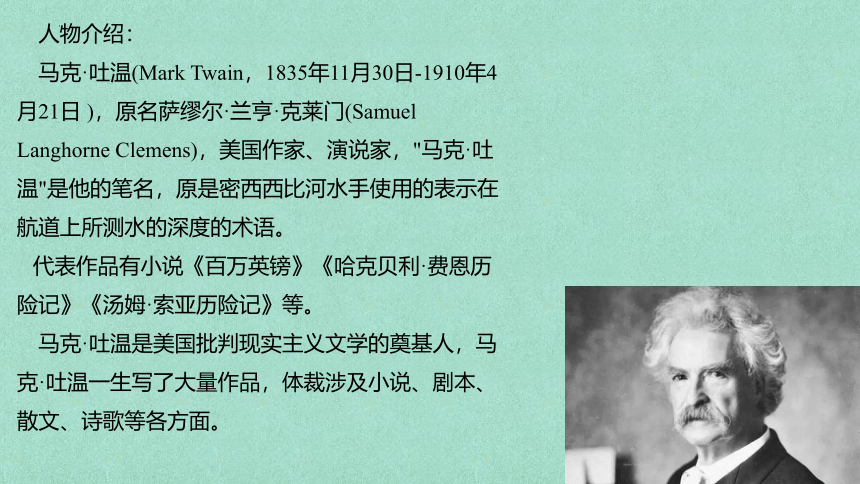
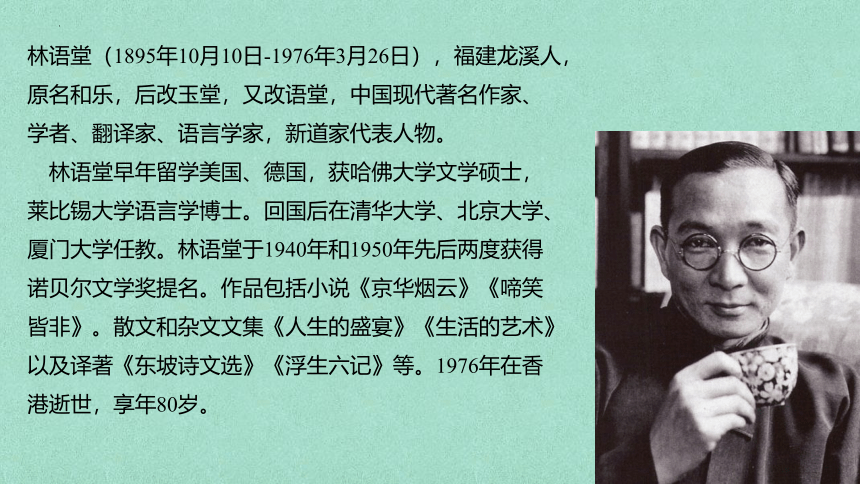
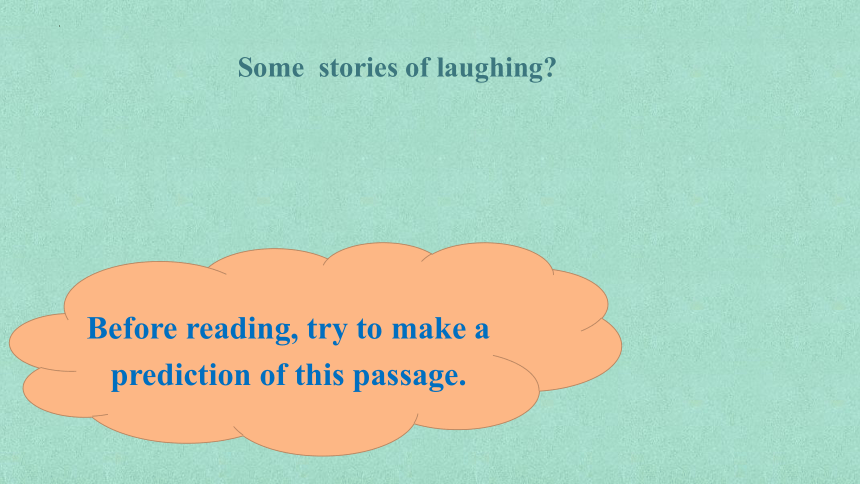
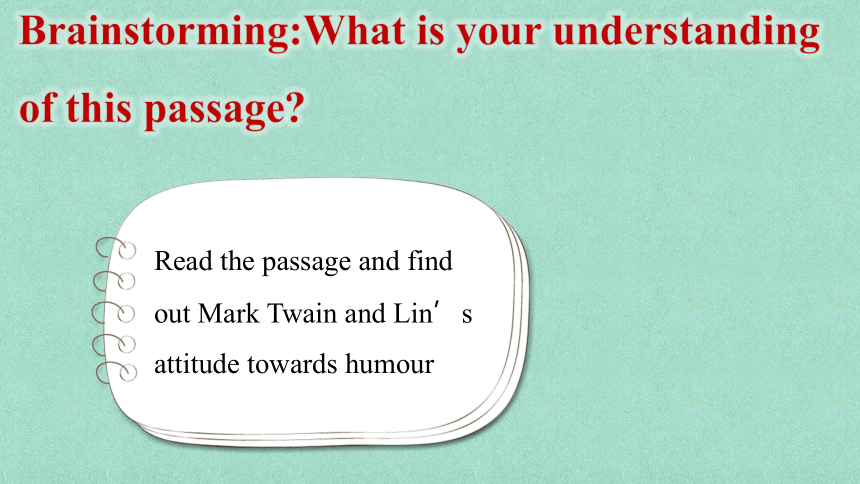
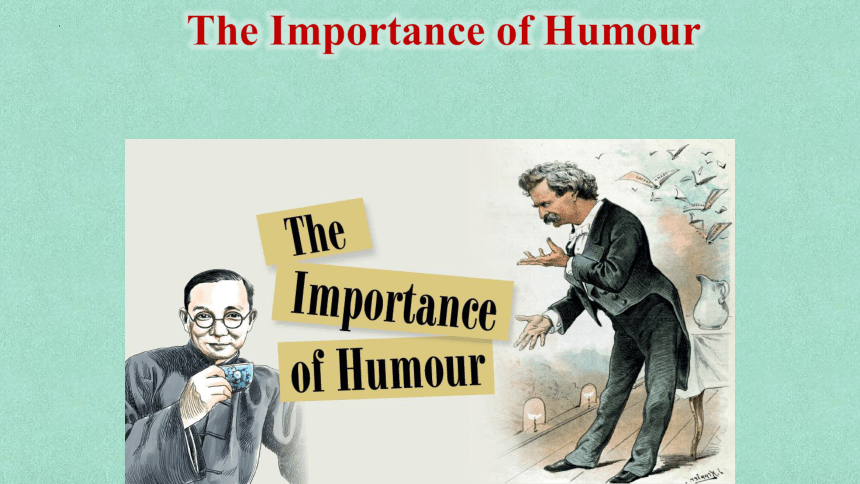
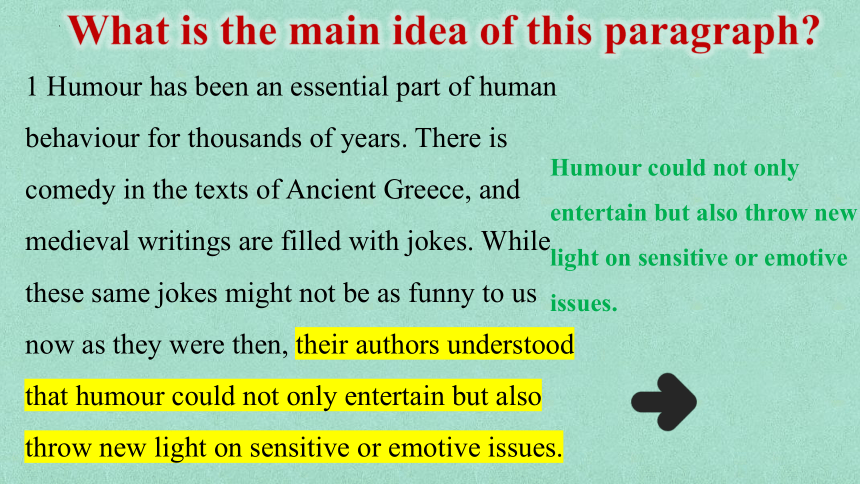
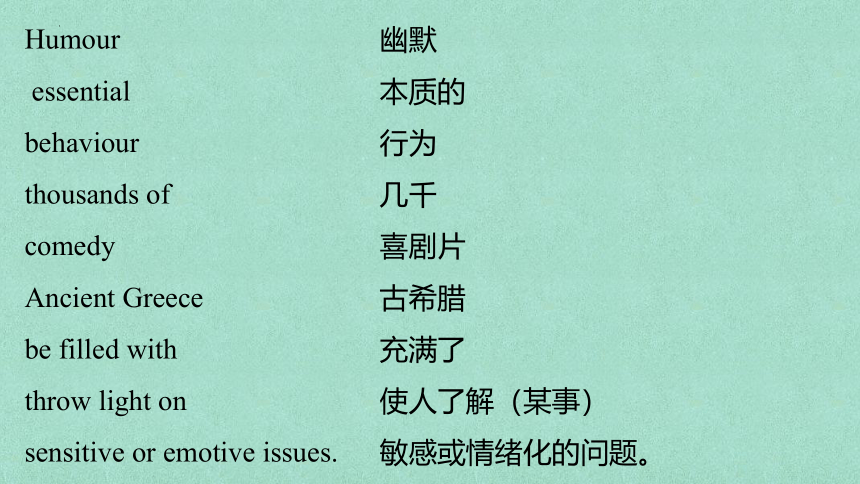
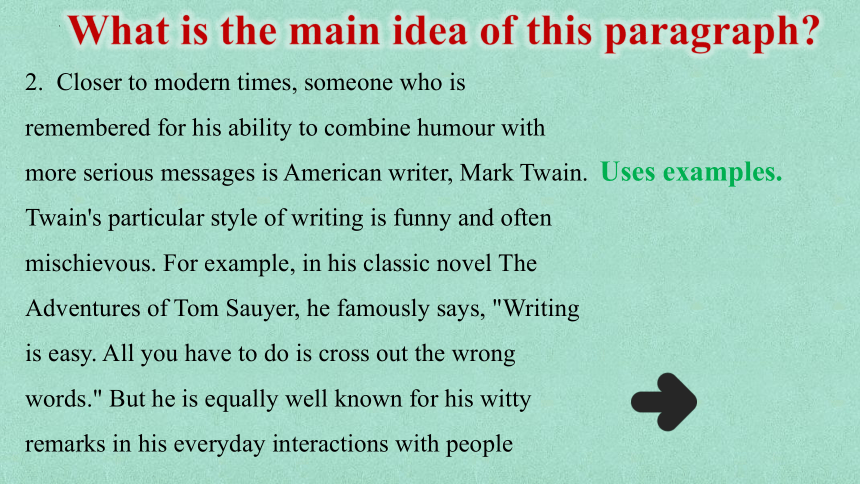
文档简介
(共31张PPT)
Unit 1
Laugh out loud!
---
Developing ideas
1. Students could memorize some words.
2. Students could know some knowledge of “Non-defining attributive clauses”.
3. Students should make several sentences by using“Non-defining attributive clauses”.
Learning Aims:
Read the introductions and share with the class.
Mark Twain (1835–1910) was an American
writer, humorist, lecturer and adventurer,
who acquired international fame for his
travel narratives, in particular The Innocents
Abroad, and for his adventure stories of
boyhood, such as The Adventures of Tom
Sawyer and Adventures of Huckleberry
Finn. He is regarded as one of North
America’s best and most beloved writers
due to his wit and satire.
重点词汇
Mark Twain 马克·吐温
humorist 幽默作家 ;
in particular 尤其 ; 特别
Innocents 无辜者 ; 无辜
boyhood 少年时代 ; 青少年时代
Huckleberry 哈克贝利 ;
one of …之一
due to 由于,因为
Lin Yutang (1895–1976) was a Chinese
writer, translator, linguist, philosopher and
inventor. His informal but sophisticated style
of writing, in both Chinese and English,
made him one of the most influential writers
of his generation. His most famous works
include My Country and My People and
The Importance of Living. He’s also known
as a wise and witty populariser of Chinese
philosophy and the Chinese way of life.
重点词汇
Lin Yutang 林语堂
linguist 语言学家
philosopher 哲学家
inventor 发明者
informal 非正式的
one of …之一
My Country 我的国家
My People 我的同胞
witty 言辞诙谐的 ;
人物介绍:
马克·吐温(Mark Twain,1835年11月30日-1910年4月21日 ),原名萨缪尔·兰亨·克莱门(Samuel Langhorne Clemens),美国作家、演说家,"马克·吐温"是他的笔名,原是密西西比河水手使用的表示在航道上所测水的深度的术语。
代表作品有小说《百万英镑》《哈克贝利·费恩历险记》《汤姆·索亚历险记》等。
马克·吐温是美国批判现实主义文学的奠基人,马克·吐温一生写了大量作品,体裁涉及小说、剧本、散文、诗歌等各方面。
林语堂(1895年10月10日-1976年3月26日),福建龙溪人,原名和乐,后改玉堂,又改语堂,中国现代著名作家、学者、翻译家、语言学家,新道家代表人物。
林语堂早年留学美国、德国,获哈佛大学文学硕士,莱比锡大学语言学博士。回国后在清华大学、北京大学、厦门大学任教。林语堂于1940年和1950年先后两度获得诺贝尔文学奖提名。作品包括小说《京华烟云》《啼笑皆非》。散文和杂文文集《人生的盛宴》《生活的艺术》以及译著《东坡诗文选》《浮生六记》等。1976年在香港逝世,享年80岁。
Before reading, try to make a
prediction of this passage.
Some stories of laughing
Read the passage and find out Mark Twain and Lin’s attitude towards humour
Brainstorming:What is your understanding of this passage
The Importance of Humour
1 Humour has been an essential part of human
behaviour for thousands of years. There is
comedy in the texts of Ancient Greece, and
medieval writings are filled with jokes. While
these same jokes might not be as funny to us
now as they were then, their authors understood
that humour could not only entertain but also
throw new light on sensitive or emotive issues.
What is the main idea of this paragraph
Humour could not only entertain but also throw new light on sensitive or emotive issues.
Humour
essential
behaviour
thousands of
comedy
Ancient Greece
be filled with
throw light on
sensitive or emotive issues.
幽默
本质的
行为
几千
喜剧片
古希腊
充满了
使人了解(某事)
敏感或情绪化的问题。
2. Closer to modern times, someone who is remembered for his ability to combine humour with more serious messages is American writer, Mark Twain. Twain's particular style of writing is funny and often mischievous. For example, in his classic novel The Adventures of Tom Sauyer, he famously says, "Writing is easy. All you have to do is cross out the wrong words." But he is equally well known for his witty remarks in his everyday interactions with people
What is the main idea of this paragraph
Uses examples.
重点词汇
modern times 现代
Mark Twain 马克·吐温
mischievous 调皮的 ; 顽皮的 ;For example 例如
have to do 必须,不得不,只好
cross out 划掉 ; 删除,删去
well known 众所周知的
What is the main idea of this paragraph
2. For instance, while on a lecturing tour of the United States, Twain went into a barber's shop to get a haircut and a shave. The barber, not recognising him, asked if he had a ticket to the lecture. When Twain replied that he didn't, the barber told him that if he wanted to go to the event he would have to stand, as there were no seats left in the theatre. Twain's response was, "That's just my luck. I always have to stand when that fellow lectures!"
Uses examples.
重点词汇
For instance 例如;譬如
lecturing 开讲座,告诫 ; lecture的现在分词
United States 美国 ;
go into 从事,讨论,进入
haircut 发型 ; 理发 ; 发式
have to 不得不 ; 必须
What is the main idea of this paragraph
3. Like Twain, but on the other side of the world, Lin Yutang was soon to become famous for his unique brand of humour. A well-known bilingual writer, Lin brought the concept of humour to modern Chinese literature. In 1924, he creativly borrowed "youmo" from Ancient Chinese as the translation for the English word "humour". "Youmo" is sill being used in this way today.
To introduces Lin Yutan as a master of humour
重点词汇
other side 【法】对方当事人
Lin Yutang 林语堂 ; 京华烟云 ; 作者
become famous 成名 ; 出名 ; 一夜成名 ; 一战成名
bilingual 双语的 ; 会说两种语言的 Chinese literature 中国文学 sill 窗台 ; 门槛
in this way 用这个办法
What is the main idea of this paragraph
4. Lin's quick wit helped make him famous as a master of humour. Once, having been invited to dinner at a university, he was put on the spot when the president suddenly asked him to give a speech. Thinking on his feet, Lin started to tell a story about a cruel Roman emperor who tried to feed a man to wild animals.
Humour also plays an important role in Lin's works and his life.
What is the main idea of this paragraph
Humour could not only entertain but also
throw new light on sensitive or emotive issues.
4. First came a lion. The man whispered something in the lion's ear, after which the lion shook its head and walked away unhappily. Then along came a tiger. Again, the man whispered in the tiger's ear. The tiger looked shocked and hurried away. "What did you say to my animals " said the emperor, astonished. "I told them they had to make a speech after eating me for dinner." Lin's audience roared with laughter. With this little joke,Lin was able to make people laugh, while gently telling off the president.
重点词汇
whispered 耳语
shocked 使震惊
hurried 匆忙完成的
emperor 皇帝
astonished 感到十分惊讶
astonish的过去分词和过去式
audience 观众
roared 吼叫 ;
gently 轻轻地 ;
president 总统 ; 国家主席 ;
What is the main idea of this paragraph
5. Both Twain and Lin understood that humour isn't just about laughter, but is a way of life and a tool that can be used to illuminate the world. Lin even created an equation to explain this concept: Reality+Dreams +Humour=Wisdom. Living and working with others can sometimes be complicated, and humour makes this easier. Sharing jokes and laughing together can bring individuals and even communities together. Indeed, some may argue that our need for humour is almost as great as our need for water and air. In the words of MarkTwain, "Humor is mankind's greatest blessing".
The conclusion: Humour is an essential part of human life
重点词汇
be used to 惯于
illuminate 照明 ; 阐明
equation 方程式
concept 概念
Wisdom 智慧 ;
complicated 复杂的 ;
Indeed 的确 ;
blessing 祝福 ; 上帝的恩宠 ;
Mark Twain
Remebered for ability to _________________with more ________________.
Writing style:_________________
Example:_____________________
Also well known for his witty remarks
Example:_______________________
combine humour
funny&mischievous
serious messages
The Adventures of Tom Sauyer
A talk with a barbar
sensitive and emotive issues
way of life
illuminate the world
Introduction
Humour is an essential part of _______________. Authors have used it to ________and throw new light on__________________
human behavior
entertain
Conclusion
Humour is a ___________ and a tool that can be used to
____________________.
Lin Yutang
Famous for his unique brand of humor
Evidence:___________________________
Quick wit helped make him famous as___________________
Example:___________________________
He once gently told off the president
a master of humour
He brought the concept of humor to Chinese literature.
How can a sense of humour help you in your daily life Give an example.
good relationship
good environment
good friends
Try to think about other benefits of humour
Question
Talk about your opinions with others.
Learning to learn
A punch line concludes a
joke and is intended to make
people laugh. In a broader
sense, a punch line can also
refer to the unexpected
and funny conclusion of any
performance, situation or story.
重点词汇
punch line 妙语
concludes 断定 ; joke 笑话 ;
laugh 笑 ; 发笑 ;
broader 宽阔的 ; 广阔的
punch 用拳猛击 ; 拳打 ;
refer to 查阅 ; 提到
unexpected 想不到的
conclusion 结论 ;
Write your ideas.
1.
2.
3.
Thank you!
Unit 1
Laugh out loud!
---
Developing ideas
1. Students could memorize some words.
2. Students could know some knowledge of “Non-defining attributive clauses”.
3. Students should make several sentences by using“Non-defining attributive clauses”.
Learning Aims:
Read the introductions and share with the class.
Mark Twain (1835–1910) was an American
writer, humorist, lecturer and adventurer,
who acquired international fame for his
travel narratives, in particular The Innocents
Abroad, and for his adventure stories of
boyhood, such as The Adventures of Tom
Sawyer and Adventures of Huckleberry
Finn. He is regarded as one of North
America’s best and most beloved writers
due to his wit and satire.
重点词汇
Mark Twain 马克·吐温
humorist 幽默作家 ;
in particular 尤其 ; 特别
Innocents 无辜者 ; 无辜
boyhood 少年时代 ; 青少年时代
Huckleberry 哈克贝利 ;
one of …之一
due to 由于,因为
Lin Yutang (1895–1976) was a Chinese
writer, translator, linguist, philosopher and
inventor. His informal but sophisticated style
of writing, in both Chinese and English,
made him one of the most influential writers
of his generation. His most famous works
include My Country and My People and
The Importance of Living. He’s also known
as a wise and witty populariser of Chinese
philosophy and the Chinese way of life.
重点词汇
Lin Yutang 林语堂
linguist 语言学家
philosopher 哲学家
inventor 发明者
informal 非正式的
one of …之一
My Country 我的国家
My People 我的同胞
witty 言辞诙谐的 ;
人物介绍:
马克·吐温(Mark Twain,1835年11月30日-1910年4月21日 ),原名萨缪尔·兰亨·克莱门(Samuel Langhorne Clemens),美国作家、演说家,"马克·吐温"是他的笔名,原是密西西比河水手使用的表示在航道上所测水的深度的术语。
代表作品有小说《百万英镑》《哈克贝利·费恩历险记》《汤姆·索亚历险记》等。
马克·吐温是美国批判现实主义文学的奠基人,马克·吐温一生写了大量作品,体裁涉及小说、剧本、散文、诗歌等各方面。
林语堂(1895年10月10日-1976年3月26日),福建龙溪人,原名和乐,后改玉堂,又改语堂,中国现代著名作家、学者、翻译家、语言学家,新道家代表人物。
林语堂早年留学美国、德国,获哈佛大学文学硕士,莱比锡大学语言学博士。回国后在清华大学、北京大学、厦门大学任教。林语堂于1940年和1950年先后两度获得诺贝尔文学奖提名。作品包括小说《京华烟云》《啼笑皆非》。散文和杂文文集《人生的盛宴》《生活的艺术》以及译著《东坡诗文选》《浮生六记》等。1976年在香港逝世,享年80岁。
Before reading, try to make a
prediction of this passage.
Some stories of laughing
Read the passage and find out Mark Twain and Lin’s attitude towards humour
Brainstorming:What is your understanding of this passage
The Importance of Humour
1 Humour has been an essential part of human
behaviour for thousands of years. There is
comedy in the texts of Ancient Greece, and
medieval writings are filled with jokes. While
these same jokes might not be as funny to us
now as they were then, their authors understood
that humour could not only entertain but also
throw new light on sensitive or emotive issues.
What is the main idea of this paragraph
Humour could not only entertain but also throw new light on sensitive or emotive issues.
Humour
essential
behaviour
thousands of
comedy
Ancient Greece
be filled with
throw light on
sensitive or emotive issues.
幽默
本质的
行为
几千
喜剧片
古希腊
充满了
使人了解(某事)
敏感或情绪化的问题。
2. Closer to modern times, someone who is remembered for his ability to combine humour with more serious messages is American writer, Mark Twain. Twain's particular style of writing is funny and often mischievous. For example, in his classic novel The Adventures of Tom Sauyer, he famously says, "Writing is easy. All you have to do is cross out the wrong words." But he is equally well known for his witty remarks in his everyday interactions with people
What is the main idea of this paragraph
Uses examples.
重点词汇
modern times 现代
Mark Twain 马克·吐温
mischievous 调皮的 ; 顽皮的 ;For example 例如
have to do 必须,不得不,只好
cross out 划掉 ; 删除,删去
well known 众所周知的
What is the main idea of this paragraph
2. For instance, while on a lecturing tour of the United States, Twain went into a barber's shop to get a haircut and a shave. The barber, not recognising him, asked if he had a ticket to the lecture. When Twain replied that he didn't, the barber told him that if he wanted to go to the event he would have to stand, as there were no seats left in the theatre. Twain's response was, "That's just my luck. I always have to stand when that fellow lectures!"
Uses examples.
重点词汇
For instance 例如;譬如
lecturing 开讲座,告诫 ; lecture的现在分词
United States 美国 ;
go into 从事,讨论,进入
haircut 发型 ; 理发 ; 发式
have to 不得不 ; 必须
What is the main idea of this paragraph
3. Like Twain, but on the other side of the world, Lin Yutang was soon to become famous for his unique brand of humour. A well-known bilingual writer, Lin brought the concept of humour to modern Chinese literature. In 1924, he creativly borrowed "youmo" from Ancient Chinese as the translation for the English word "humour". "Youmo" is sill being used in this way today.
To introduces Lin Yutan as a master of humour
重点词汇
other side 【法】对方当事人
Lin Yutang 林语堂 ; 京华烟云 ; 作者
become famous 成名 ; 出名 ; 一夜成名 ; 一战成名
bilingual 双语的 ; 会说两种语言的 Chinese literature 中国文学 sill 窗台 ; 门槛
in this way 用这个办法
What is the main idea of this paragraph
4. Lin's quick wit helped make him famous as a master of humour. Once, having been invited to dinner at a university, he was put on the spot when the president suddenly asked him to give a speech. Thinking on his feet, Lin started to tell a story about a cruel Roman emperor who tried to feed a man to wild animals.
Humour also plays an important role in Lin's works and his life.
What is the main idea of this paragraph
Humour could not only entertain but also
throw new light on sensitive or emotive issues.
4. First came a lion. The man whispered something in the lion's ear, after which the lion shook its head and walked away unhappily. Then along came a tiger. Again, the man whispered in the tiger's ear. The tiger looked shocked and hurried away. "What did you say to my animals " said the emperor, astonished. "I told them they had to make a speech after eating me for dinner." Lin's audience roared with laughter. With this little joke,Lin was able to make people laugh, while gently telling off the president.
重点词汇
whispered 耳语
shocked 使震惊
hurried 匆忙完成的
emperor 皇帝
astonished 感到十分惊讶
astonish的过去分词和过去式
audience 观众
roared 吼叫 ;
gently 轻轻地 ;
president 总统 ; 国家主席 ;
What is the main idea of this paragraph
5. Both Twain and Lin understood that humour isn't just about laughter, but is a way of life and a tool that can be used to illuminate the world. Lin even created an equation to explain this concept: Reality+Dreams +Humour=Wisdom. Living and working with others can sometimes be complicated, and humour makes this easier. Sharing jokes and laughing together can bring individuals and even communities together. Indeed, some may argue that our need for humour is almost as great as our need for water and air. In the words of MarkTwain, "Humor is mankind's greatest blessing".
The conclusion: Humour is an essential part of human life
重点词汇
be used to 惯于
illuminate 照明 ; 阐明
equation 方程式
concept 概念
Wisdom 智慧 ;
complicated 复杂的 ;
Indeed 的确 ;
blessing 祝福 ; 上帝的恩宠 ;
Mark Twain
Remebered for ability to _________________with more ________________.
Writing style:_________________
Example:_____________________
Also well known for his witty remarks
Example:_______________________
combine humour
funny&mischievous
serious messages
The Adventures of Tom Sauyer
A talk with a barbar
sensitive and emotive issues
way of life
illuminate the world
Introduction
Humour is an essential part of _______________. Authors have used it to ________and throw new light on__________________
human behavior
entertain
Conclusion
Humour is a ___________ and a tool that can be used to
____________________.
Lin Yutang
Famous for his unique brand of humor
Evidence:___________________________
Quick wit helped make him famous as___________________
Example:___________________________
He once gently told off the president
a master of humour
He brought the concept of humor to Chinese literature.
How can a sense of humour help you in your daily life Give an example.
good relationship
good environment
good friends
Try to think about other benefits of humour
Question
Talk about your opinions with others.
Learning to learn
A punch line concludes a
joke and is intended to make
people laugh. In a broader
sense, a punch line can also
refer to the unexpected
and funny conclusion of any
performance, situation or story.
重点词汇
punch line 妙语
concludes 断定 ; joke 笑话 ;
laugh 笑 ; 发笑 ;
broader 宽阔的 ; 广阔的
punch 用拳猛击 ; 拳打 ;
refer to 查阅 ; 提到
unexpected 想不到的
conclusion 结论 ;
Write your ideas.
1.
2.
3.
Thank you!
